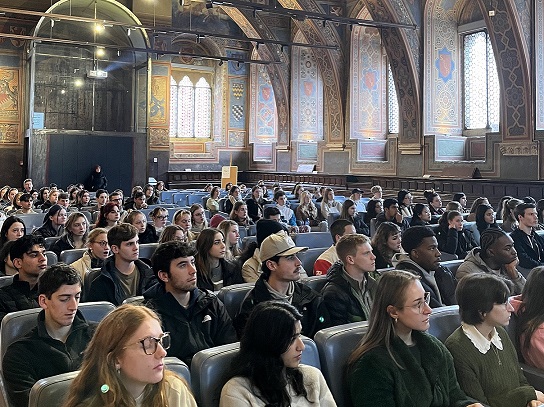New research confirms “the Umbra Effect”

A just-published academic journal article confirms what Umbra staff have long suspected: that studying at The Umbra Institute can actually change students.
The Way to Measure Personal Growth: Surprising Gains in Global Perspectives
Every Umbra staff member can think of a number of students who demonstrated personal growth while in Perugia but the academic team wanted to assess whether or not that growth was actually measurable across the whole student body. Starting in Fall 2021, almost all Umbra students filled out an optional beginning-of-semester survey, and then did the same survey at the end of the semester. The survey had several questions about their expectations for or experiences in Perugia, but also had the fifteen questions that form the short version of the Miville-Guzman Universality-Diversity Scale (the M-GUDS-S). The scale asks a series of questions that together assess students’ agreement with the idea that while people in different countries are different, they also have much in common.
The Research Initiative
Jacopo Bernardini, Umbra’s Associate Director Program Management & Institutional Development, was the architect of the project. Bernardini has a Phd in Sociology with a specialization in the methodology of surveys; he imagined that given that students who would choose to study abroad, and to study abroad in Perugia, might already be relatively high on the scale. Indeed, on a scale that goes from 1 to 6, Umbra students’ overall average is consistently around 4.75. But what has surprised Bernardini and the whole academic team was that in every semester since Fall 2021, students’ scores in aggregate have gone up to around 5.0, a huge gain on a six-point scale: something that could be called “the Umbra Effect.”
Beyond Expectations: A Quantifiable Leap
Bernardini and the academic team wrote up the results with the help of Paola Cascinelli (Arcadia University’s Resident Director in Italy) and Amanda Fontana, who was then an intern at Umbra and now works in ISI Abroad’s Boston office. While there is a large academic literature on assessing the impact of study abroad, there were few examples of study abroad programs undertaking such institutional investment. The team submitted the manuscript to Frontiers, the premier journal for US-based education abroad professionals; in summer 2022 and after several rounds of review and revision, the journal published the article, entitled “Assessing the Effects of Semester-Length Study Abroad with the Miville-Guzman Universality-Diversity Scale.” The team has already begun work on the follow-up article, which shows that one of the primary drivers for this change is community engagement–a key part of Umbra’s academic approach.
Interested in learning more about the “Umbra Effect”? Contact [email protected] to be connected with our academic team about its research or to learn about other ways that you or your students can connect with the Umbra Institute.